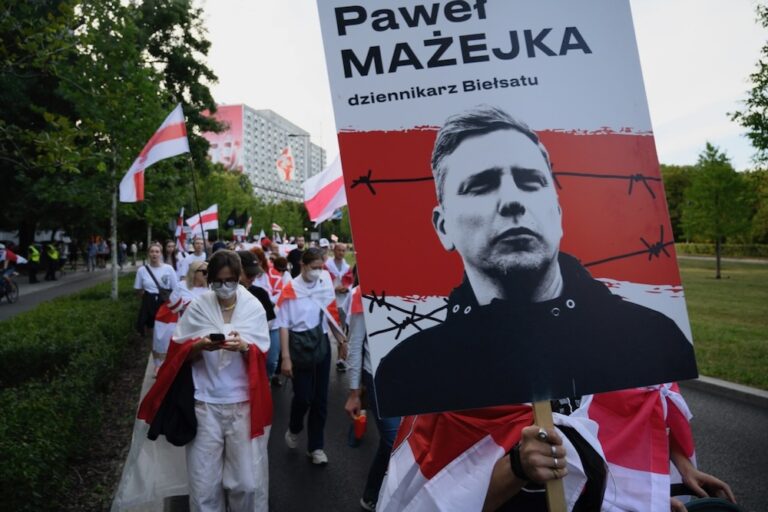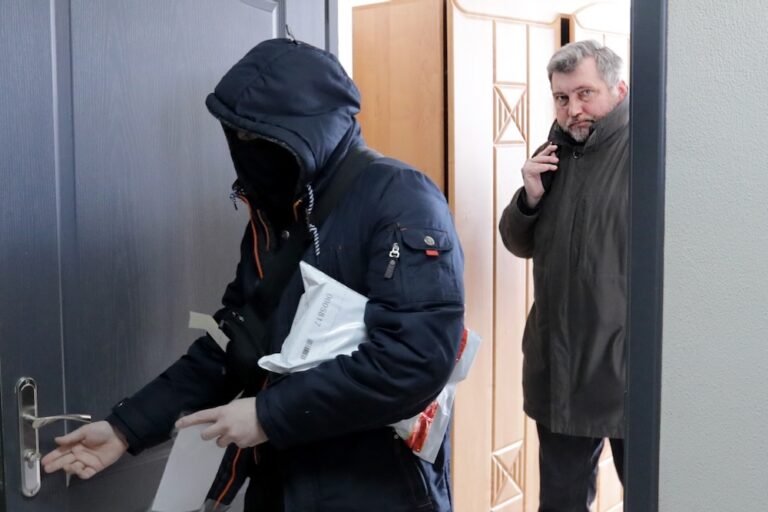(HRW/IFEX) – Human Rights Watch has expressed its extreme alarm at the disappearance of Victor Gonchar and Anatoly Krasovsky. On 16 September 1999, Gonchar, vice-speaker of the Thirteenth Supreme Soviet and Krasovsky, head of the “Krasika” publishing house, traveled to a local sauna and were due to return home later that evening. They did not […]
(HRW/IFEX) – Human Rights Watch has expressed its extreme alarm at the
disappearance of Victor Gonchar and Anatoly Krasovsky. On 16 September 1999,
Gonchar, vice-speaker of the Thirteenth Supreme Soviet and Krasovsky, head
of the “Krasika” publishing house, traveled to a local sauna and were due to
return home later that evening. They did not return. Gonchar’s wife,
Zinaida, reportedly contacted city law enforcement agencies, local hospitals
and morgues without result. Gonchar had been due to address a sitting of the
Thirteenth Supreme Soviet on 19 September regarding the composition of the
opposition delegation to OSCE-mediated talks, and to meet with the U.S.
ambassador to Belarus on 20 September.
On 1 March, police violently assaulted and arrested Gonchar on charges of
holding an illegal meeting in a private cafe, for which he served ten days
in detention. Prior to his release, Gonchar was charged with “abuse of
office” under Article 190 of the criminal code, a case which had yet to be
brought to trial.
The disappearance of Gonchar and Krasovsky is but the latest in a series of
“disappearances” of prominent opponents of President Lukashenka’s government
this year. On 8 April, Tamara Vinnikova disappeared; she is the former chair
of the national bank, arrested in January 1997 on embezzlement charges. That
Vinnikova was held under house arrest, guarded at all times by live-in KGB
agents, her telephone calls and visitors strictly screened, strongly
suggests that her disappearance was orchestrated by the authorities. On 7
May, Yuri Zakharenka, former interior minister and an opposition activist,
was last seen being bundled into a car by a group of unidentified men. His
wife later told reporters that for two weeks prior to his abduction,
Zakharenka had complained of being tailed by two cars. Zakharenka had issued
an appeal in early 1999 to law enforcement agencies not to obey orders from
the president after 20 July (the end of the presidential mandate under the
1994 constitution) and had also been in the process of forming the
Belarusian Union of Officers, a potentially powerful and influential body.
On 16 May, Oleg Volchek, head of an independent commission on Zakharenka’s
disappearance stated that the latter was “probably kidnapped,” while
comments attributed to President Lukashenka blamed his disappearance on
debts to “the mafia.”
Recommended Action
Send appeals to the president:
government officials may betray official indifference to the disappearances
of Gonchar and Krasovsky. In an interview with the Interfax newsagency, Ivan
Pashkevich, deputy head of the presidential administration, reportedly
stated that “Gonchar disappeared just like Yury Zakharenka. He disappeared
just to attract public attention to the next session of the Thirteenth
Supreme Soviet”
Krasovsky, Vinnikova, and Zakharenka and to ensure the safety and security
of all those living in Belarus, regardless of their political affiliations
Please copy appeals to the source if possible.


